
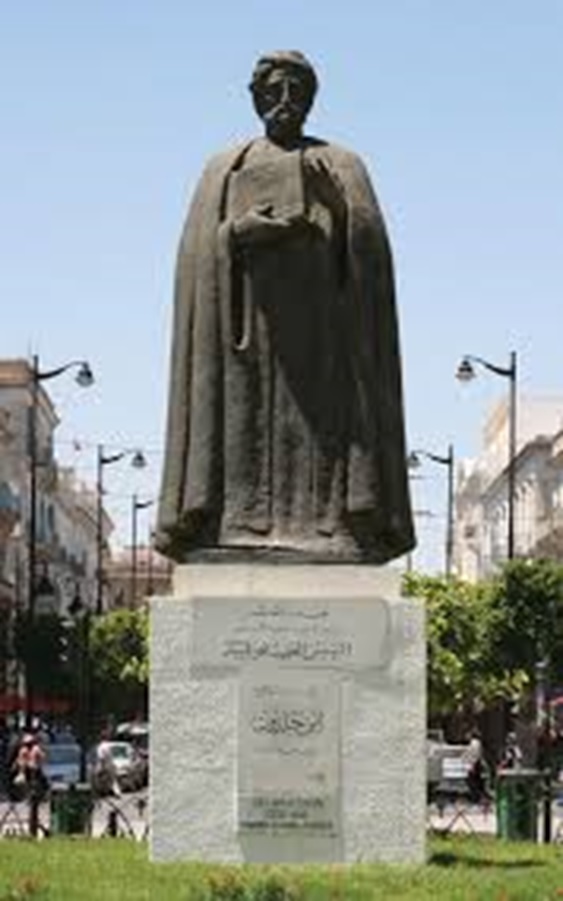
"We need to develop a post-Khaldunian paradigm, or a new theoretical and methodological framework to study global society in the 21st century - to discover a General Theory" – Image Brittanica
Ibn Khaldun and the Understanding of Civilizations - II
By Dr Akbar Ahmed
American University
Washington, DC

Let us examine two case studies of two different Muslim responses to the challenges of our world.
Case Study One: The Scholarship of Inclusion
Scholars like Professor Richard Falk of Princeton University have argued that there is a deliberate attempt to “exclude” Islam from the community of world civilisations, to make it a pariah, a non-person (2000). The Muslim response has been two-fold: either to advocate a policy of inclusion, in the hope of generating dialogue and understanding, or that of exclusion, of confrontation and rejection. For the latter there is therefore a double burden of exclusion. In the following pages we will discuss both kinds of Muslim responses.
Muslims, wherever they live, are aware of the crisis in society if not the Khaldunian theory of its breakdown. They react according to their ideas and capabilities.
In my case, from the vantage point of Cambridge University, I set myself the ambitious task of not only recording but also attempting to repair the breakdown. I spent over a decade writing academic books on the subject, appearing on the media to explain it, making films about it and organising people to help me repair it. Projects such as the six-part BBC television series Living Islam and the Jinnah Quartet were initiated and completed. Seen as landmark events, these projects helped to change the negative climate around Islam, and they assisted in the start of serious interfaith dialogue.
Great debate, controversy and passion were roused by the projects. This was understandable: they were not just changing images in the media, in itself a major challenge, but touching on central issues in society such as leadership, the nature of the state, and the status of women and minorities. Above all, they emphasised the compassionate and tolerant nature of Islam. Religious, ethnic and national boundaries were being crossed and people were as ready to dismiss and debunk as they were to support.
But defending such positions comes at a cost. Hurdles were put in the path of these projects, even from inside. Bogus and absurd accusations were spread in the steady disinformation campaign. Salman Rushdie, for instance, was alleged to have written the script for the film Jinnah; some saw it as part of a Hindu conspiracy, others as a Zionist one. The latter suspicion was no doubt confirmed in some minds when I became the first Muslim to be invited to deliver the annual Rabbi Goldstein Memorial Lecture for 1999 by the Liberal and Progressive Synagogues of the UK in the central synagogue in St John’s Wood, London.
Earlier I had been invited to deliver Evensong in Selwyn College Chapel, Cambridge, the first Muslim Don to be given the honour. The events were widely covered in the British media and seen as significant steps in interfaith dialogue. While most Muslims supported the initiatives, some were unhappy. A few argued that Jews and Christians were “enemies” and to visit their places of worship was akin to blasphemy for a Muslim. I was walking perilously close to fatwa territory.
Some not so influenced by notions of idealism and more interested in keeping ledgers may ask was it worth it? They will point to the physical dangers, the lies and slander, the financial sacrifices and the emotional exhaustion. My answer may be different from that of those who love me, especially the women in my life like my mother, my daughters and my wife who was with me every step of the way, standing shoulder to shoulder and without whom the projects would have been unmanageable if not impossible. They were concerned that I had taken on a global challenge unnecessarily and was being exposed to danger in a turbulent society and time. The answer therefore is difficult and complex but I believe contained in the following paragraph.
These projects and their theme of dialogue and understanding were not only changing British royalty and creating understanding for Islam but making an impact on ordinary Muslims. Even religious leaders of all shades responded to my work both positively and negatively. Most important, the young were being influenced by the projects. After a seminar at Princeton earlier this year, a student introduced himself as a Pakistani from Lahore. He said he had an eight-year-old nephew who would tell him that he wished to grow up to join the Pakistan army in order to kill Hindus. After seeing the Jinnah film, he now says he wants to grow up to be another Jinnah and a man of justice and peace. The change in the world-view of the little boy in Lahore would justify the sacrifices and the tribulations in the battle for ideas; he owns this century.
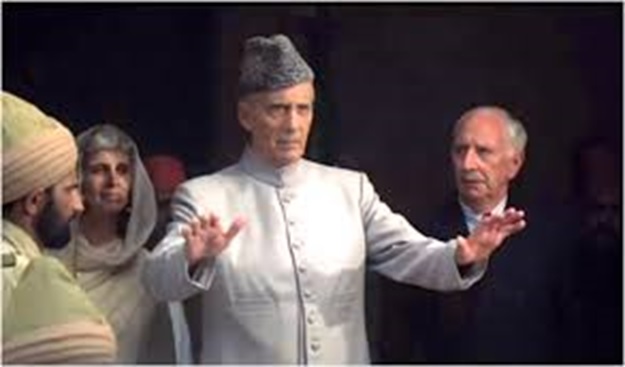
After a seminar at Princeton earlier this year, a student introduced himself as a Pakistani from Lahore. He said he had an eight-year-old nephew who would tell him that he wished to grow up to join the Pakistan army in order to kill Hindus. After seeing the Jinnah film, he now says he wants to grow up to be another Jinnah and a man of justice and peace. The change in the world-view of the little boy in Lahore would justify the sacrifices and the tribulations in the battle for ideas; he owns this century. Photo above: Christopher Lee as the Quaid i Azam in the movie Jinnah
When the various projects were completed, I was acutely aware that the road was littered with aborted projects of a similar nature and the cemetery full of scholars less intellectually and culturally ambitious than we were. Take the example of Ataturk, the proposed film project about the founder of modern Turkey, which was abandoned due to the opposition to it at the time we were battling for Jinnah. Antonio Banderas, who was to play Ataturk, received so many death threats that he backed out.
At the end of the road, I made a choice to sever my links from the bureaucracy of Pakistan (see details in Yaqub 2001). It had been a long and tiring decade with what seemed to be non-stop action. I had helped to change the image of Islam and I had taken initiatives in interfaith dialogue. But I had changed too. I was exhausted and needed to withdraw from the world for a while. I headed for Princeton University.
The rhythm of campus life, the enthusiasm of my students, the affection and generosity of my host and friend Professor Lawrence Rosen and the excitement of being at one of the finest universities in the world – Princeton was recognised as number one in the US when I arrived – helped to revivify my spirit. The discussions on campus encouraged me to think of the last decade and try to extract theoretical and intellectual conclusions from the experiences (see section below – “Searching for a Post-Khaldunian Paradigm: Global Society in the 21st Century”).
I have given you a personal glimpse of what it is like to engage in the current debate about civilisations and the price that may come with it. You will also, perhaps, appreciate more fully why the life of Ibn Khaldun has a resonance for me.
Other Muslims have taken different routes to respond to the Khaldunian breakdown, their endeavors also raising controversy and debate. One such group is the Taliban who are criticised by many, and not only in the West, for their treatment of women and the minorities. They remain a mystery to the world and it is to them that we now turn.
Case Study Two: The Scholarship of Exclusion
Because so little is known of the Taliban several false assumptions are made about them: that they are simply an ethnic expression of tribal social structure; that they are defined and contained by Afghanistan; that they are a passing phenomenon and quite marginal to the Muslim world and that by ignoring them they will fade into oblivion.
To make matters worse, the social and political factors that explain the emergence of the madrassahs or religious schools, which produced the Taliban, remain largely unstudied. The emergence of the prototype madrassahs of Pakistan needs to be viewed in the context of the decline of Western-style education and administration and their loss of credibility for ordinary people. Madrassahs stand for a system, which is the cheaper, more accessible and more “Islamic” alternative.
The unexpected and unpredictable expressions of religious revivalism today would have surprised the philosophers and sociologists of the modern age. Certainly Nietzsche, who declared God dead, and even Weber who saw the Protestant Ethic as laying the foundations for a stable, safe, capitalist and bureaucratic world would have been surprised
The syllabus of a typical madrassah is exclusively Islamic in content. Its basis is the Qur’an and the Sharia. That is how it should be for an Islamic school. But the Qur’an – and the Prophet – (together, the Sharia) – repeatedly ask Muslims to acquire knowledge. “Go to China in the quest for knowledge,” said the Prophet. China then, in the 7th century, symbolised the farthest non-Muslim civilisation. It was a challenge to the imagination to even think of the journey.
Yet after numerous discussions with teachers and an examination of madrassah syllabi, I noted that there are no non-Muslim philosophers or historians on it – not even modern ones like Marx or Weber. Worse: even the Muslim ones like Ibn Khaldun who are thought to be too “scientific” are missing. The philosophy of the typical syllabus is reduced to what commentators call “political Islam”: Islam as a vehicle for all-encompassing change; Islam as a challenge not only to the corrupt local elite but also to the world order.
While the often Westernised nationalist leaders of the post-independence period sought to hold on to the state and consolidate it, the new leaders hope to destroy it as a legacy of the West and then re-create it in an Islamic mould. The former sought survival in a transitional world; the latter demand purity in an impure one.
After an initial period after independence when prestige was attached to Westernised schools, madrassahs began to flourish from the 1970s onwards most notably in South Asia (there are estimated to be 50,000 in Pakistan alone: see Stern 2000). Remittances from the Middle East provided funding and allowed central government channels to be bypassed. The war in Afghanistan against the Soviet occupation in the 1980s provided a global stage and a global cause to the young and the zealous.
These madrassahs laid the foundations for the populist and militant Islamic leadership that would emerge in the 1990s. Mostly from poor, rural backgrounds, speaking only the local language, dressed traditionally with beards that assert their Islamic identity, these students would become the warriors who formed the Taliban and go on to conquer Afghanistan. The word Taliban – from talib or student, the product of the madrassah – entered the global vocabulary.
The battle of Afghanistan was won not on the playing fields of the Etons of the Muslim world but in the humble classrooms and courtyards of the madrassah. Its outcome challenged and changed the already shaky educational and political structures in the entire region and not just in Afghanistan. The impact of the Taliban kind of thinking, directly or indirectly, can be seen in Muslim groups from Los Angeles to Lahore.
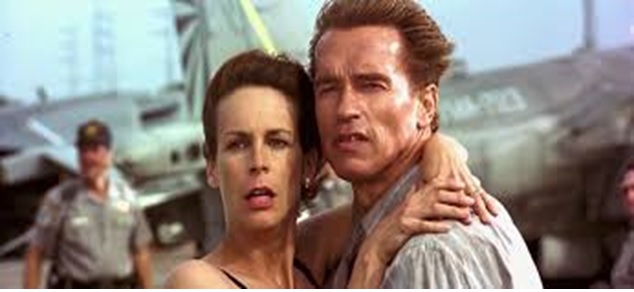
Wherever they live, Muslims are aware of the injustices of their rulers and the fact that some enjoy support in the West, the cultural invasion from the West and the stereotypes of Muslims in the Western media such as the Hollywood films True Lies (1994), Executive Decision (1996) and The Siege (1998), in which Muslims are shown as terrorists and fanatics
Wherever they live, Muslims are aware of the injustices of their rulers and the fact that some enjoy support in the West, the cultural invasion from the West and the stereotypes of Muslims in the Western media such as the Hollywood films True Lies (1994), Executive Decision (1996) and The Siege (1998), in which Muslims are shown as terrorists and fanatics. These are not marginal or art films but big-star, big-budget, mainstream “blockbusters” seen by millions. They influence public opinion. Such negative propaganda coupled with what is seen as the indifference of the West to the outstanding political problems in the Muslim world combine to create a focus on the West as the root cause of Muslim problems. We have lost our honour, the honour of our faith and traditions and have no power to correct the wrongs of our own world, Muslims lament, blaming the West for this loss. From this perception to actively opposing the West as a form of jihad, or religious war, is one short step for groups like the Taliban.
The bitter anti-Western edge to the Taliban comes partly from their feeling that while they sacrificed their lives and land in fighting the Soviets as allies of the Americans, when it was over the Americans left them and their devastated land in the lurch. They will remind you that those being called “crazies” and “extremists” were once hailed as “freedom fighters” by the West. Their actions, such as the destruction of the priceless Buddhist statues, are partly motivated by a psychological compulsion to enrage and defy their critics.
Although the Taliban-style leadership is “new” in the sense that it emerged in opposition to the more Westernised leaders in power after the Second World War, in fact the division in Muslim leadership goes back to the 19th century. In 1857, after the great uprisings in
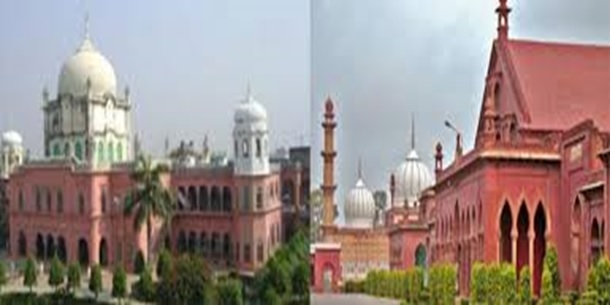
Sir Sayyed Ahmed Khan, who created the Aligarh University (right) on the model of Oxbridge, wished to synthesise Islam and modernity. Iqbal, Jinnah and the leaders of the Pakistan movement would be inspired by Sir Sayyed. In contrast, the founders of the madrassah at Deoband (left) near Delhi, fought the British during the 1857 uprisings, and their schools now influence groups like the Taliban
India against British rule, two rival models of leadership began to emerge. Sir Sayyed Ahmed Khan, who created the Aligarh University on the model of Oxbridge, was a loyal servant of the Raj and wished to synthesise Islam and modernity (see Ahmed 1997a). Iqbal, Jinnah and the leaders of the Pakistan movement would be inspired by Sir Sayyed. In contrast, the founders of the madrassah at Deoband near Delhi, fought the British during the uprisings, and their influential schools created networks throughout India and now influence groups like the Taliban. The schism in Muslim leadership, Osama at one end and Jinnah at the other of the spectrum, is thus rooted in the indigenous response to modernity and the threatening presence of Western imperialism.
We saw the interconnectedness of our world in the aftermath of the attack on the USS Cole. Clinton in Washington threatened Osama; the head of the Islamic party, the JUI, in Pakistan in turn threatened all Americans in Pakistan, including the Ambassador, if Osama was harmed; Afghanistan was on high alert and Americans throughout the world were warned to be on guard. Once again Islam had been pushed in a certain direction by those of its leaders wanting confrontation with the West.
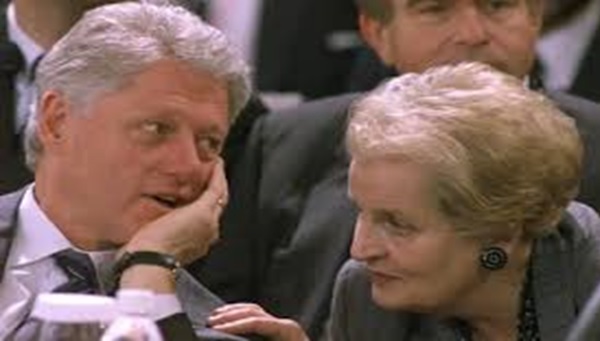
Clinton and his Secretary of State, Madeleine Albright, had correctly predicted that such events were a foretaste of things to come; that this is the way that the wars of the future will be fought. They may be right. But the response of the Muslim world will depend on the nature of Muslim
Clinton and his Secretary of State, Madeleine Albright, had correctly predicted that such events were a foretaste of things to come; that this is the way that the wars of the future will be fought. They may be right. But the response of the Muslim world will depend on the nature of Muslim leadership, whether the Osama model prevails, or that of Jinnah. The relationship between Islam and the West will play a major part in influencing the course of events in the 21st century
leadership, whether the Osama model prevails, or that of Jinnah. The relationship between Islam and the West will play a major part in influencing the course of events in the 21st century.
We have established through the case studies above that there is an ongoing, sometimes simmering, sometimes explosive, conflict of civilisations; but we have also illustrated that there is a serious and committed movement towards dialogue. Let us now explore possible directions for the future.
Searching for a Post-Khaldunian Paradigm: Global Society in the 21st Century
With Khaldun’s cycle broken down – with the inter-penetration of global religious cultures, with the emergence of the audio-visual media penetrating even the most remote areas, with the mounting clamour of those who see the signs of the apocalyptic end of time, with the scholars silenced, with the growing sense of despair at the poverty and inequality in many parts of the world that challenges the notion of a just God in heaven who maintains a balance in human society based on justice and order – we need to develop a post-Khaldunian paradigm; a new theoretical and methodological framework to study global society in the 21st century; to discover a General Theory.
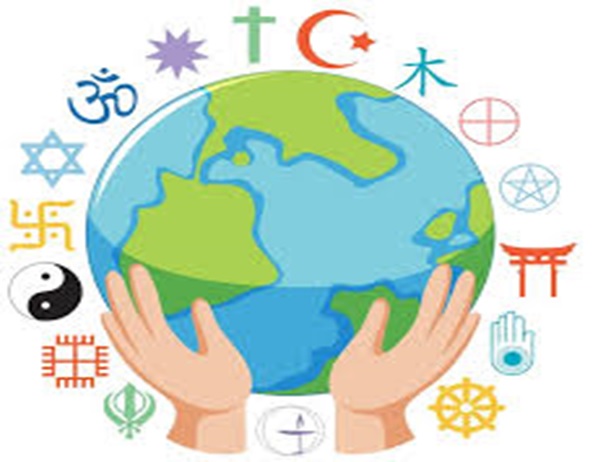
Studying the main global religions in interplay, sometimes clashing, sometimes in alliance, can provide a clue. Of these, Islam remains the most misunderstood. All the religions are in need of understanding as they are usually viewed through the lens of stereotype and caricature; perhaps none more so than Islam. Islam continues to get a bad press and evoke hostility globally
The unexpected and unpredictable expressions of religious revivalism today would have surprised the philosophers and sociologists of the modern age. Certainly Nietzsche, who declared God dead, and even Max Weber who saw the Protestant Ethic as laying the foundations for a stable, safe, capitalist and bureaucratic world would have been surprised. For the former, God was back, and it seemed, with a vengeance; for the latter He was busy challenging and upsetting the very order that He was supposed to champion. Perhaps Marx would be the most surprised. Religion is no longer an “opiate” numbing people into docility; it is more like “speed.”
Studying the main global religions in interplay, sometimes clashing, sometimes in alliance, can provide a clue. Of these, Islam remains the most misunderstood. All the religions are in need of understanding as they are usually viewed through the lens of stereotype and caricature; perhaps none more so than Islam. Islam continues to get a bad press and evoke hostility globally.
The thesis about the clash of civilisation, which remains influential in some circles, rests on the assumption that the wars of this century will be fought along religious lines. It is therefore logical and urgent to understand what factors are responsible for the emergence of religion and how religion will be playing a role in deciding political developments in this century.
We need to penetrate beneath the sensationalist nature of these theories and discover alternative ways of understanding society. We do not suggest that we accept each other’s or all religions uncritically but that we understand them in order to make sense of what is happening in global society.
In this connection, certain important questions need to be asked, which are of immediate and urgent relevance to the world civilisations. Different civilisations look differently at the idea of the divine. Muslims are often attacked in the media for what is called revivalism or the resurgence of Islam, but religious revivalism is taking place globally, in Judaism, Christianity, Hindu and Buddhist societies. The “re-discovery” of the divine is noted even in Western scientific and intellectual circles once dismissive of religion (Glynn 1999). We need to know how the different world civilisations view themselves and each other; we need to know what they see as their vision of the coming time; we need to view their ideas of “the end of time.”
This raises our first set of questions: Why is there a revival of religions and how are people negotiating the idea of God or the divine? Is the revival a consequence of the processes of and transformations resulting from globalisation? Is the explanation to be found in the weakening of traditional structures – like the family and the nation state – as individuals look to religion to provide certainty in an uncertain world, continuity in a changing one. Is it an attempt to (re)create asabiyah in order to (re)build “human civilisation”?
Finally, can we apply Khaldunian theories to non-Muslim civilisations? Indeed, can they be applied to Muslim societies when there are no significant cyclical – or even linear – movements of tribal or rural people taking place anymore?
A second set of questions to raise is: why is the understanding of the divine often distorted through the prism of violence? Why are people killing and raping in the name of the divine? No religion encourages violence of this kind, and yet we see examples throughout the world today on our television sets and read about them in the news. Why are people not able to focus on the compassion and goodness in the idea of the divine? This failure has global implications for what scholars call the “clash of civilisations.”
Thirdly, we need to ask: what is to be done about it? Can there be genuine dialogue across religions and national boundaries that negate the idea of a clash of civilisations? How can this be implemented in a practical way, which will affect the thinking and behaviour of people?
These are questions, which would not have occurred naturally to Ibn Khaldun. His was a Muslim world, admittedly disintegrating in one part but strong in other parts, and there was nothing but Islam on the horizon. For us, the dialogue of civilisation is a necessary pre-condition to global harmony. But dialogue by itself is no solution. There has to be dialogue that leads to the understanding of other civilisations. For this, we have to move beyond, for example, Islam and understand the religions it interacts with: Judaism, Christianity, Hinduism and Buddhism. Muslims are living as neighbours with these other civilisations, and are often isolated and don't understand them. The same is true of other faiths looking at Islam. Too many non-Muslims see Islam as caricature and as distorted images from press reporting. With understanding comes sympathy and compassion towards those who do not belong to our group or community or religion. This is where scholars and thinkers who can transcend religious and national positions and reach out become crucial to the global debate that is taking place.
Conclusion
In conclusion: What can be done to encourage dialogue? The first steps are to try to understand the world we live in, and the way it is forming. In the short-term, the prospects for a harmonious relationship between Islam and the West look uncertain, even pessimistic. In the longer-term a great deal will depend on whether those who encourage dialogue and understanding will succeed or not.
The common problems – which affect everyone regardless of race, nationality or religion – in this shrinking world need to be identified to strengthen the idea of dialogue: drug and alcohol abuse, divorce, teenage violence and crime, ethnic and racist prejudice, the problems of the aged and the poor; the challenge of the growing sense of anarchy and rampant materialism; the sexual debasement of women and children; the depletion of our natural resources and ecological concerns. On all these issues many Muslims find support for taking a strong, enlightened position in Islam. This is the real Islamic jihad and, if it is properly harnessed and understood, it can provide fresh, sorely needed strength to these most crucial of global issues.
Muslims face an internal challenge. Reducing a sophisticated civilisation to simple rituals encourages simple answers: reaching for guns and explosives, for instance. For Muslims to confront the world with poise and confidence is to re-discover and even begin to repair the mainsprings of Islamic civilisation. They need to re-build an idea of Islam which includes justice, integrity, tolerance and the quest for knowledge - the classic Islamic civilisation - not just the insistence on the rituals; not just the five pillars of Islam but the entire building.
The West must put pressure on Muslim governments – and it interacts with most of them overtly or covertly – to get their act together, to ensure justice and provide clean administration. It must send serious signals to the ordinary Muslim people – through its media, through seminars, conferences, meetings – that it does not consider Islam as the enemy, however much it may disagree with certain aspects of behaviour carried out by Muslims.
This Address is merely an exploratory discussion suggesting directions for research. Serious and urgent re-thinking is required by the scholars, policy planners and policy makers in the corridors of power – not only in Washington, London, Moscow and Paris but also in Cairo, Kabul and Tehran.
We need to be thinking in terms of what Ibn Khaldun called “human civilisation” or, to use the contemporary phrase, globally. We may not like words such as postmodernism and globalisation, but only with the compassionate understanding of other civilisations, through the development of the scholarship of inclusion, can we resolve some of the deleterious consequences of globalisation such as the increasing gap between the rich and the poor and the growing sense of despair especially in the latter. The tragic confrontation between the great faiths taking place in the Balkans, the Middle East and South Asia, the mindless cycle of violence, must be checked in this century through the dialogue of civilisations.
The creative participation in the dialogue of civilisations, to find an internal balance between our traditions and the changing, often alien world around us, the committed search for global solutions to the global problems confronting human society and the quest for a just and peaceful world will be the challenge we face in the 21st century.
Bibliography
Abdal Majid al Najjar, The Viceregency of Man: Between Revelation and Reason (Hermdon, Virginia: International Institute of Islamic Thought, 2000)
Abdulaziz Sachedina, The Islamic Roots of Democratic Pluralism, (Oxford: Oxford University Press, 2001)
AbdulHamid AbuSulayman, Crisis in the Muslim Mind (Herndon, Virginia: International Institute for Islamic Thought, 1993)
AbdulHamid AbuSulayman, Towards an Islamic Theory of International Relations: New Directions for Methodology and Thought, (Herndon, Virginia: International Institute for Islamic Thought, 1993)
Adam Lebor, A Heart Turned East: Among the Muslims of Europe and America, (London: Little, Brown and Co., 1997)
Ahmed Rashid, Taliban: Militant Islam, Oil and Fundamentalism in Central Asia, (New Haven: Yale University Press, 2000)
Akbar S. Ahmed, Discovering Islam: Making Sense of Muslim History and Society, (London: Routledge, 1988)
Akbar S. Ahmed, Jinnah, Pakistan and Islamic Identity: The Search for Saladin, (London: Routledge, 1997)
Akbar S. Ahmed, Mataloona: Pukhto Proverbs (Karachi: Oxford University Press, 1975)
Akbar S. Ahmed, Postmodernism and Islam: Predicament and Promise (London: Routledge, 1992)
Akbar Ahmed, Pukhtun Economy and Society: Traditional Structure and Economic Development in a Tribal Society (London, Routledge & Kegan Paul, 1980)
Akbar S. Ahmed, Resistance and Control in Pakistan (Lon- don, Routledge, 1991)
Akbar S. Ahmed, The Quaid: Jinnah and the Story of Pakistan (Karachi: Ox- ford University Press, 1997)
Akbar S. Ahmed and Lawrence Rosen, "Islam, Academe, and Freedom of the Mind," The Chronicle of Higher Education, November 2, 2001.
Albert Hourani, A History of the Arab Peoples (London: Faber and Faber, 1991)
Alija Ali Izetbegovic, Islam between East and West (Indianapolis, IN: American Trust Publications, 1993)
Anthony Giddens, Runaway World: How Globalization is reshaping our lives, (London: Routledge, 2000)
Anthony Giddens, The Consequences of Modernity (Cambridge, Polity Press, 1990)
Benjamin R. Barber, Jihad vs. McWorld, (New York: Times Books, 1995)
Bernard Lewis, The Multiple Identities of the Middle East, (New York: Schocken Books, 1998)
Bruce David Forbes and Jeffrey
Conrad Phillip Kottak, Cultural Anthropology, (University of Michigan and New York: McGraw-Hill, Higher Education, 2000)
Courtesy of QNews, London, July, 2001.
Dare to Dream, Montage Productions, UK
Dawn (December 27, 2000)
Deina Abdelkader, Social Justice in Islam (Hermdon, Virginia, International Institute of Islamic Thought, 2000)
Dialogue of Civilization: An Introductory Civilizational Analysis by Victor Segesvary (Lanham, Maryland: United Press of America, 2000)
Diana L. Eck, A New Religious America: How A "Christian Country" Has Become the World's Most Religiously Diverse Nation, (San Francisco: Harper, 2001).
Douglas Johnston and Cynthia Sampson (eds.), Religion, The Missing Dimension of Statecraft (Oxford and New York: Oxford University Press, 1994)
Ernest Gellner, Muslim Society (Cambridge: Cambridge University Press, 1981)
Eck, A New Religious America: How A "Christian Country" Has Become the World's most Religiously Diverse Nation
Felipe Fernandez Armesto, Millennium: A History of the Last Thousand Years, (New York: Scribner, 1995)
Francis Fukuyama, The End of History and the Last Man (New York: Bard, 1998)
Fred Halliday, Islam and the Myth of Confrontation, (London: I.B. Tauris, 1996)
Freedom at Midnight by Larry Collins and Dominique Lapierre (New Delhi, Vikas, 1994. Originally published in 1976)
Friedrich Nietzsche, Beyond Good and Evil, translated by Walter Kaufmann, (New York: Vintage, 1966)
Friedrich Nietzsche, Twilight of the Idols: The Anti-Christ, translated by R. J. Hollingdale, (Middlesex, England: Harmondsworth, Penguin, 1972)
Giandomenico Picco, "A Dialogue Among Civilizations," in Seton Hall Journal of Diplomacy and International Relations, Vol. 2, No. 1 (Winter/Spring, 2001)
Grace Halsell, Prophecy and Politics: Militant Evangelists on the Road to Nuclear War (Westport, Connecticut: Lawrence Hill and Co., 1986)
Grace Halsell, Forcing God's Hand - Why Millions Pray for a Quick Rapture — and destruction of Planet Earth (Washington, DC: Cross- roads Int. Publishing, 1999
Graham E. Fuller and Ian 0. Lesser, A Sense of Siege, (Boulder, CO: Westview/RAND, 1995)
M. G. S. Hodgson, The Venture of Islam, (Chicago: The University of Chicago Press, 1974), 3 Volumes.
H. Mahan (eds.), Religion and Popular Culture in America (Berkeley, CA: University of California Press, 2001)
Holy Qur'an, Sura V (Al-Ma'ida), 32
Holy Qur'an, Sura XXX (Al-Rum), verse 22.
Holy Qur'an, Sura II (Al-Baqara), Verse 115.
Human Development Report (Oxford and New York: Oxford University Press, United Nations Development Program, 1995)
Huston Smith, Why Religion Matters: The Fate of the Human Spirit in an Age of Disbelief (San Francisco: Harper, 2001)
Ian Hawkey, "Ambassador for Islam" in CAM: The University of Cambridge Alumni Magazine, Cambridge, UK, Easter Term, 1995
Ibn Khaldun, The Muqaddimah: An Introduction to History, translated by Franz Rosenthal in three volumes, one volume abridgement by N.J. Dawood (Princeton, Princeton University Press, 1969)
Interview with Al-Jazeera television (Qatar), broadcast October 7, 2001
Ira G. Zepp Jr., A Muslim Primer: Beginner's Guide to Islam, (Westminster, Maryland: Wakefield Editions, 1992)
"Iranian Counsel on 'Jinnah'," The Friday Times (Lahore, Pakistan), May 16-22, 1997
"Islam and the West," speech by the Prince of Wales, Oxford Centre for Islamic Studies, October 27, 1993.
Jama'at-i-Islami, in The News (London), June 2, 2000
James Mittelman, The Globalization Syndrome: Transformation and Resistance, (Princeton: Princeton University Press, 2000)
Jeffrey Goldberg, "The Education of a Holy Warrior," New York Times Magazine, June 25, 2000
Jessica Stern "Pakistan's Jihad Culture," Foreign Affairs, Vol. 79, No. 6 (November/December, 2000)
"Jews and Jinnah," The Friday Times, March 28-April 3, 1977.
Jinnah Quartet: "Akbar Ahmed's Achievements" (London, The News, November 30, 1998).
John L. Esposito, The Islamic Threat: Myth or a Reality? (New York: Oxford University Press, 1992)
John Micklethwait and Adrian Wooldridge, A Future Perfect: The Challenge and Hidden Promise of Globalization (New York: Times Books, 2000)
John Paul II, Crossing the Threshold of Hope, (New York, Alfred A. Knopf, 1994).
Karen Armstrong, The Battle for God: Fundamentalism in Judaism, Christianity and Islam (London: HarperCollins, 2000)
Khalid Duran, author of Children of Abraham: An Introduction to Islam for Jews (Hoboken, NJ: The American Jewish Committee, Distributed by Ktav Publishing House, 2001)
Lawrence Rosen, Bargaining for Reality: The Construction of Social Relations in a Muslim Community (Chicago: The University of Chicago Press, 1984)
M. Patricia Mische and Melissa Merkling (eds.), Towards a Global Civilization? The Contribution of Religions (New York: Peter Lang Publishing, Inc., 2001)
Martin Lings, What is Sufism? (Cambridge, UK, The Islamic Texts Society, 1995)
Mary Kaldor, New and Old Wars: Organized violence in a Global era (Cambridge: Polity Press, 1999)
Melvyn Bragg (now elevated to the House of Lords) on June 16, 1997.
Muhammad Khatami, "Dialogue of Civilizations" (New York: United Nations General Assembly, September 24, 1998)
Muhsin Mahdi, "Ibn Khaldun" in International Encyclopedia of the Social Sciences, Edited by David L. Sills (New York, The MacMillan Co., 1968), Vol. 7, pp. 56
Muhsin Mahdi, Ibn Khaldun's Philosophy of History: A Study in the Foundation of the Science of Culture (Chicago: The University of Chicago Press, 1957).
Patrick Glynn, God: The Evidence — The Reconciliation of Faith and Reason in a Postsecular World (Rocklin, CA: Forum: Prima Publishing, 1999).
Paul Findley, Silent No More: Confronting America's False Images of Islam, (Beltsville, Maryland: Amana Publications, 2001).
Professor Saad Eddin Ibrahim [Sa'd al-Din Ibrahim], the noted Egyptian scholar and Director of the Ibn Khaldun Center in Cairo, on the cover of The New York Times Magazine (June 17, 2001)
Ralph Braibanti, "Islam and the West: Common Cause or Clash?" (Washington, DC: Georgetown University, Occasional Paper Series, The Center for Muslim-Christian Understanding, 1999)
Richard Attenborough's film Gandhi
Richard Falk, Human Rights Horizons: the Pursuit of Justice in a Globalizing World, (New York and London: Routledge, 2000)
Richard Falk, Predatory Globalization: A Critique (Cambridge: Polity Press, 1999)
Robert Chase et al., "Pivotal States and US Strategy," Foreign Affairs, Vol. 75, No. 1, (January/ February, 1996).
Robert Kaplan, The End of the Earth: From Togo to Turkmenistan, from Iran to Cambodia, a Journey to the Frontiers of Anarchy, (New York: Vintage Books, 1997).
Robert Wuthnow, After Heaven: Spirituality in America since the 1950s (Berkeley, CA: University of California Press, 2001)
Sahih al-Bukhari, Number 6763
Salman Rushdie of Satanic Verses
Samuel P. Huntington, "The Clash of Civilizations?", Foreign Affairs, Vol. 72, No. 3 (Summer 1993).
Samuel P. Huntington, The Clash of Civilizations and the Remaking of World Order (New York: Simon and Schuster, 1996).
Shagufta Yaqub, "Profile: Ambassador of Dialogue," Pakistan Link, July 13, 2001
Shahid Javed Burki, "Population as an Asset," Paki- stan Link (California), August 10, 2001.
Stuart L. Pimm, The World According to Pimm: A Scientist Audits the Earth (New York: Mc-Graw Hill, 2001)
Sunan Darami, number 242
The Meaning of the Glorious Quran, translated by Marmaduke Pickthall (Hyderabad-Deccan, India: Government Central Press, 1938)
Thomas Friedman, The Lexus and the Olive Tree: Understanding Globalization, (New York: Farrar, Straus and Giroux, 2000)
Toynbee in The Observer
William T. Vollmann, "Across the Divide: What do the Afghan People Think of the Taliban?" The New Yorker, May 15, 2000
Zygmunt Bauman, Globalization: The Human Consequences (Cambridge: Polity Press, 1998)
(Akbar Ahmed is Distinguished Professor and the Ibn Khaldun Chair of Islamic Studies, School of International Service, American University, Washington DC. He is a Wilson Center Global Fellow. He was the former Pakistan High Commissioner to the UK and Ireland.)

